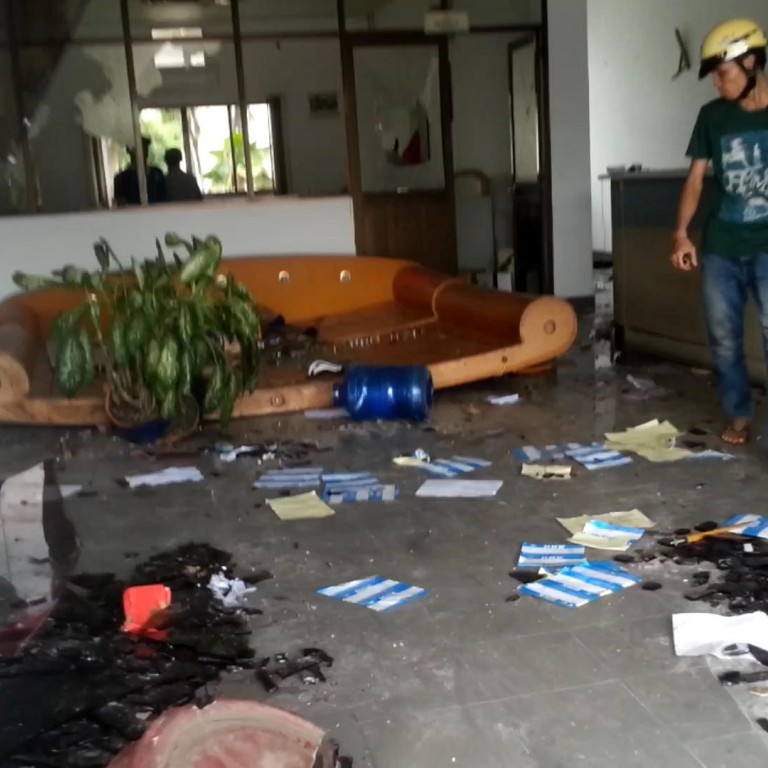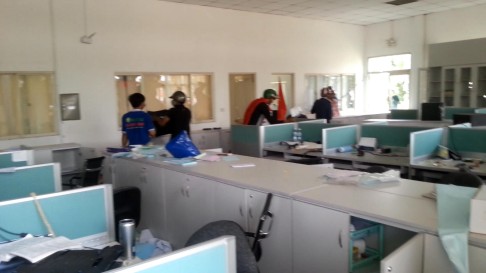
Deadly riots in Vietmam over Chinese oil rig put investment at risk
Chinese factory owners reappraise plans in Vietnam after plants attacked
The row between China and Vietnam over oil drilling in the South China Sea has cast a shadow on Chinese investment in the country and threatens regional trade.
Tensions between the two nations after a week of demonstrations and riots against China's deployment of an oil rig off the disputed Paracel Islands showed no sign of abating yesterday, though Commerce Minister Gao Hucheng was scheduled to meet his Vietnamese counterpart in a reconciliation effort.
Some Hong Kong manufacturers fear the anti-China emotions will spread to neighbouring countries such as Cambodia and Thailand, popular production bases for Hong Kong and mainland Chinese manufacturers.
The chairman of the Hong Kong Garment Manufacturers Association, Willie Fung Wai-yiu, said the dispute had left many manufacturers considering relocating their factories from mainland China to cheaper Southeast Asian countries in limbo.
"Many are perplexed," he said. "Vietnam has been a top option for such relocations, but the question now is what other options are available?"
Fung said many exporters had left the Pearl River Delta in the past few years for countries with lower costs and bigger pools of labour such as Vietnam, Cambodia, Thailand and Bangladesh.

Now - with pictures broadcast around the world of Vietnamese protesters attacking foreign factories, leaving at least one person dead and hundreds injured - the situation is a lot worse.
The protests and riots were triggered when China set up an oil rig in the Paracels two weeks ago. It sparked anti-China violence in southern and central Vietnam on Tuesday and Wednesday that forced thousands of mainland Chinese, Hong Kong and Taiwanese investors to flee for their lives.
"We fear the anti-Chinese emotions may spill into the neighbouring countries," Fung said.
A finance director with a Hong Kong manufacturer of chips and electronic parts in Ho Chi Minh said the company was having second thoughts about expanding its factory in the city's Vietnam-Singapore Industrial Park, the epicentre of the clashes on Tuesday and Wednesday.
"We used to have minor worker strikes, but the local government swiftly intervened and settled them," he said.

The company, which employs about 2,000 workers, put on hold a plan to add production lines and hire extra workers.
Manufacturing and exports accounted for 75 per cent of Vietnam's economy in 2012, up from 56 per cent in 2009. The bulk of manufacturing was funded by foreign investment.
China was the ninth largest foreign investor in Vietnam last year, putting in US$6.94 billion, mostly in manufacturing and infrastructure, according to Vietnam's Ministry of Finance. Taiwan is the fourth biggest investor, with Hong Kong at No 6.
Thomas Chan Man-hung, professor and head of the China Business Centre of Hong Kong Polytechnic University, said soured Sino-Vietnamese relations hurt trade ties and clouded Vietnam's economic prospects.
"Southeast Asian countries rely for their growth on China more than on Japan in terms of trade," he said. "Despite this, China's political rows with Vietnam, Japan and the Philippines won't do any good for bilateral or regional trade and business ties."
Chan said the political instability in the region would complicate the creation of a single market and production base called the Asean Economic Community - involving the 10 Asean countries of Indonesia, Malaysia, the Philippines, Singapore and Thailand, Brunei, Vietnam, Laos, Myanmar and Cambodia.
Chinese in Vietnam fear for their safety as attacks continue
Sporadic attacks against ethnic Chinese were still taking place in Binh Duong province yesterday - although there had been no large-scale violence since Thursday, according to a source on the ground.
The source, a Taiwanese businessman who did not want to be named for fear of reprisal, said he knew of at least four people who had been attacked since Thursday in the province, on the outskirts of Ho Chi Minh City. Many Taiwanese have moved out of their homes and checked into hotels, and factories have removed Chinese characters from their signage.
The Taiwanese consulate in Ho Chi Minh City issued a circular yesterday warning about a protest today. A Taiwanese business association in Vietnam warned of an exodus of Taiwan capital if violence broke out again, according to the .
At the Tan Thuan industrial park on the city's east side, Japanese firms have painted the red sun of the nation's flag on vehicles and hung Japanese and Vietnamese flags at their gates. Most factories were shut and the streets were almost empty.
Workers at a canteen said they wanted to join today's protest but could not because their Vietnamese factories would be operating. But many residents say anti-China sentiment has gone too far.
"If these demonstrators love their country, they should stop," said Tran Quang Huy, a 21-year old coffee shop manager. "This will only provoke China and make our situation worse."
"It's not up to [the demonstrators] to say how we deal with the East Sea problem," said a 20-year old Ho Chi Minh City resident who only wanted to be identified by her nickname, Han. Vietnamese refer to the South China Sea as the East Sea. "It's like they are rushing into a situation they cannot control."
Many Vietnamese were hesitant to speak on the record. "We don't talk about politics here," said a university lecturer. "We can't."
A staff member at the China Business Association in the city said they had not yet been able to contact all members since riots faded in the early hours of Thursday. "We are still working on identifying who has been affected," he said.
But more Chinese were flying home yesterday. One of them, a teacher at a school in Binh Duong province, said she was leaving because her family was too concerned over her safety. "The protests are not representative of the Vietnamese people," she said. "My co-workers are good people. I want to return."

